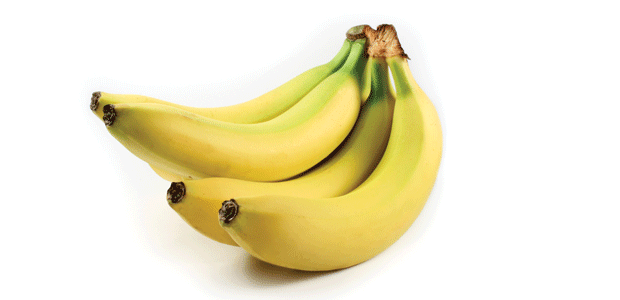Advertisement
Bananas
A treasure trove of health

We’ve all heard the saying, an apple a day keeps the doctor away. But now there’s a new one. Go for the gold—golden bananas, that is.
This common fruit is packed with goodness. Each bite offers you vitamins B and C, potassium, dietary fibre, and magnesium. Bananas do everything from protecting the heart to soothing stomach ulcers, from improving elimination to building bones. And they do it with a smooth, sweet taste. What’s not to love?
No prescription needed
A study in the International Journal of Cancer showed that eating more than 2.5 servings of fruits and vegetables per day, especially bananas, reduces your risk of kidney cancer by 40 percent. Why? Researchers believe the high amounts of antioxidant phenolic compounds in bananas detoxify potential cancer-causing agents.
Experiencing stress or taking diuretics for your heart can cause your body’s potassium level to plummet. Bananas, which are high in potassium, help to normalize your heartbeat and regulate your body’s water balance, reducing the strain on your heart and kidneys. In addition, the soluble fibre in bananas binds to dietary cholesterol, which is then eliminated from the digestive system. This means less buildup in your arteries, decreasing your chances of a heart attack.
Bananas also benefit your brain. According to a study in the New England Journal of Medicine, eating potassium-rich foods such as bananas can reduce your risk of dying from a stroke by as much as 40 percent. Another study, the Dietary Approaches to Stop Hypertension (also known as DASH) found that eating healthy foods, including bananas, could lower blood pressure as effectively as certain prescription medicines.
Bones and bananas
You won’t find bananas on a list of foods high in calcium. However, if your body can’t absorb the calcium, your bones won’t get the benefit. Bananas aid calcium absorption in two ways. First, ripe bananas are a powerhouse of fructooligosaccharide (FOS), a type of fibre known as a prebiotic. When FOS interacts with the microflora in your colon, it increases your gut’s acidity, allowing your body to absorb more calcium from food.
Second, FOS also acts as a nutrition source for probiotic (friendly) bacteria in your colon. These beneficial bacteria increase your digestive ability, allowing you to absorb more nutrients, including calcium, from your food. In addition, they may contribute to a stronger immune system.
Unripe green bananas, though not often eaten by North Americans, contain indigestible short-chain fatty acids which can act on the stomach’s lining, enhancing its ability to absorb calcium.
Speaking of your gut
While constipation and diarrhea may not be polite topics of conversation, the truth is that many of us suffer from one or both conditions. Once more, it’s bananas to the rescue.
Bananas contain pectin, a soluble fibre. If you’re constipated, the fibre can help restore normal movement through the digestive tract. If you suffer from diarrhea, the fibre can absorb some of the excess fluid. Also, the potassium in bananas helps replenish lost electrolytes. In fact, since they are so easily digested, they are one of the foods recommended for those with gastroenteritis.
More banana benefits
Bananas are the one raw fruit that won’t cause more distress during an ulcer flare-up. They reduce stomach acidity and irritation by stimulating cells that line the stomach to produce thicker mucus. If you don’t want an ulcer, the protease inhibitors in bananas will help you eliminate bacteria in the stomach that are a primary cause of ulcers.
If you’re trying to quit smoking, snack on a banana. Its vitamin B6, and B12, along with potassium and magnesium, can ease the effects of nicotine withdrawal.
Bananas make you happy. The tryptophan they contain stimulates your brain to produce serotonin, a chemical that relaxes you while improving your mood. If you’re suffering from morning sickness, snacking on a banana will keep your blood sugar levels up and reduce your nausea.
Adding bananas to your diet
Bananas are perfect for lunch boxes and snacks. Add them to fruit salads, put them in peanut butter sandwiches, or blend them into smoothies. For nutritious frozen fruit pops, combine bananas with juice and yogourt, freeze for several hours, and enjoy.
Mash or cut them up for muffins, pancakes, crepes, cookies, or banana bread. Be adventurous and use them in soups, curries, salsas, and stir-fries. No matter how you eat them, bananas are one of nature’s best health boosters. Start peeling.
Storage dos and don’ts
All bananas need to ripen are time and room temperature. If you’re short on time, place unripe bananas in a paper bag with an apple. The apple gives off a natural gas that ripens bananas quickly.
Unripe bananas and a refrigerator, however, are a bad combination, as the cold permanently stops the ripening process. That’s good news for ripe bananas you’re not ready to use. Storing them in the fridge stops them from further ripening, although their peels will turn dark. Let the bananas come to room temperature before you eat them to restore full flavour.
You can even freeze ripe bananas for up to two months. Peel them, sprinkle the pulp with lemon juice to prevent browning, and wrap them in plastic.
Buying by the colour
To allow for transport time, bananas are generally harvested while still green. As they ripen, their peels turn yellow. Further ripening results in brown spots, and an overripe banana will become increasingly brown.
When you buy bananas, choose the colour that fits your needs. Yellow and brown-spotted bananas are ready to be eaten soon; green ones take a few more days to ripen. For baking, choose those with brown spots because of their extra sweetness and softness. No matter what colour their skin, look for firm bananas with unbroken skin, stems, and tips.
Note: If you have diabetes or kidney disease, check with your health practitioner before including bananas in your diet.




